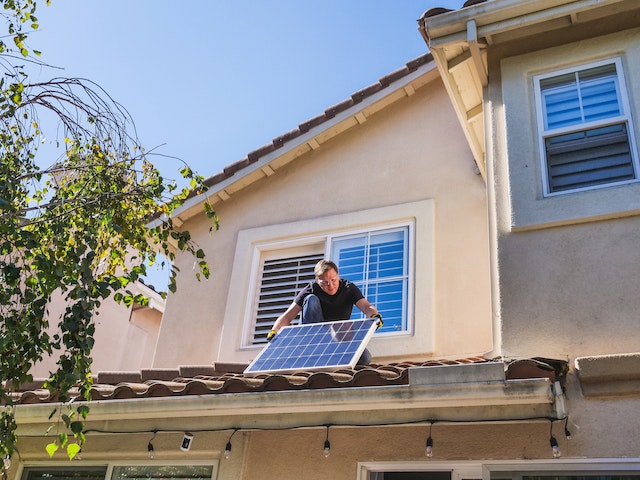Regular roof inspections are crucial for maintaining the overall health and longevity of your home. They help identify potential issues early on, preventing costly damage and ensuring the safety of your property. By hiring a professional inspector like Quality Roofer Dallas, located at 11127 Shady Trail Ste 104, Dallas, TX 75229, United States, you can ensure a thorough and accurate assessment of your roof’s condition.
One of the main benefits of regular roof inspections is the early detection of problems. Over time, roofs can develop issues such as leaks, damaged shingles, or structural weaknesses. Identifying these problems early on prevents them from escalating and causing more significant damage to your home. This can save you money on extensive repairs and prevent potential hazards, such as water damage or mold growth.
Another benefit of regular inspections is the maintenance of your roof’s lifespan. A well-maintained roof can last for several decades, protecting your home and investment. By conducting regular inspections, you can address any issues that may shorten your roof’s lifespan, ensuring that you get the most out of your investment.
Hiring a professional inspector for your roof inspection offers several advantages. First, a professional inspector has the necessary training, experience, and tools to conduct a thorough and accurate assessment of your roof’s condition. This means they can identify issues that you may not be able to spot yourself, ensuring that no potential problems are overlooked.
Additionally, a professional inspector can provide expert advice on how to address any issues they find. They can recommend appropriate repairs or maintenance, helping you make informed decisions about the best course of action for maintaining your roof’s health.
Lastly, hiring a professional inspector can save you time and effort. Inspecting a roof can be a time-consuming and labor-intensive process, especially for those who lack experience or knowledge in this area. By outsourcing this task to a professional, you can focus on other aspects of your home maintenance while ensuring your roof receives the attention it needs.
Regular roof inspections are essential for maintaining your home’s safety, longevity, and value. Hiring a professional inspector ensures a thorough and accurate assessment, helping you identify and address potential issues before they become costly problems.
Exterior Roof Inspection
Inspecting the exterior of the roof is a critical part of a comprehensive roof inspection. This process involves several steps to ensure that every aspect of the roof is thoroughly examined for potential issues. The following are the primary steps involved in inspecting the exterior of the roof:
Checking For Visible Damage
The first step in an exterior roof inspection is to look for any visible signs of damage. This includes examining the shingles for curling, buckling, or missing pieces, as well as checking for any dents or cracks in the roofing material. The inspector will also look for granule loss on asphalt shingles, which is an indicator of wear and tear. Any signs of damage can indicate potential issues that need further attention.
Assessing Gutters And Drainage Systems
Proper drainage is essential for maintaining the integrity of your roof. The inspector will examine the gutters and downspouts to ensure they are securely attached, free of debris, and functioning correctly. They will also check for any signs of water damage or staining on the exterior walls, which may indicate improper drainage or gutter issues.
Examining Vents, Chimneys, And Flashing
Roof vents and chimneys are critical for proper ventilation and the safe operation of your home’s heating system. The inspector will check for any signs of rust, damage, or deterioration in these areas, as well as ensure they are properly sealed to prevent water intrusion. Flashing, the metal strips that seal the edges and joints of your roof, will also be examined for any signs of damage or improper installation, as this can lead to leaks and water damage.
Inspecting The Roof’s Overall Structure
The inspector will evaluate the overall structure of the roof, checking for any signs of sagging or unevenness. They will also examine the fascia and soffit, the boards that run along the roof’s edge, for any signs of rot or damage. Any issues with the roof’s structure can indicate underlying problems that require further investigation and possible repairs.
By carefully inspecting the exterior of the roof, a professional inspector like Quality Roofer Dallas, located at 11127 Shady Trail Ste 104, Dallas, TX 75229, United States, can identify any signs of damage or potential issues that may impact the roof’s performance and longevity. You can reach them at 2148337020 for expert assistance. Addressing these issues promptly can help prevent more extensive damage and costly repairs down the line.
Interior Roof Inspection
An interior roof inspection is an equally important part of a comprehensive roof assessment, as it helps identify potential issues that may not be visible from the outside. The following are the primary steps involved in conducting an interior roof inspection:
Assessing Attic Ventilation And Insulation
Proper attic ventilation and insulation are crucial for maintaining a healthy roof and preventing issues such as ice dams and mold growth. The inspector will evaluate the ventilation system, checking for any blockages or damaged vents, and ensure that the attic space has adequate airflow. They will also examine the insulation for any signs of moisture, damage, or inadequate coverage, which can impact the energy efficiency of your home and contribute to roof-related issues.
Identifying Water Damage And Leaks
Water damage is a common issue that can lead to more significant problems if not addressed promptly. The inspector will thoroughly examine the attic space and interior ceilings for any signs of water damage, such as stains, discoloration, or mold growth. They will also look for any active leaks, which may require immediate attention and repairs.
Inspecting TheStructural Integrity of The Roof
The inspector will carefully assess the roof’s structural components, such as the rafters, trusses, and decking, for any signs of damage or weakness. This includes checking for any signs of wood rot, cracked or warped boards, and any evidence of insect or animal infestations. Any issues with the structural integrity of the roof can compromise its stability and may require immediate attention.
Examining Interior Roof Penetrations
The inspector will also check any interior roof penetrations, such as plumbing vents, skylights, or chimneys, for proper sealing and flashing to ensure they are not causing leaks or water damage. They will look for any signs of rust, damage, or deterioration in these areas and may recommend repairs or replacements if necessary.
By conducting a thorough interior roof inspection, a professional inspector like Quality Roofer Dallas, located at 11127 Shady Trail Ste 104, Dallas, TX 75229, United States, can identify potential issues that may not be visible from the exterior. You can learn more about their services by visiting their website at https://qualityroofer.com/service-areas/dallas-tx/. Addressing these issues promptly can help prevent more extensive damage and costly repairs, ensuring the continued safety and longevity of your roof.
Post-Inspection Recommendations
After completing a comprehensive roof inspection, the professional inspector will discuss their findings with the homeowner to ensure they understand the condition of their roof and any potential issues that may need addressing. The following are the key aspects of this discussion:
Reviewing The Findings
The inspector will provide a detailed report of their inspection findings, highlighting any areas of concern and explaining the potential consequences if these issues are not addressed. They will also provide photos or videos to help the homeowner visualize the problems, making it easier for them to understand the scope and severity of the issues.
Discussing Potential Repairs
Based on the inspection findings, the inspector will recommend appropriate repairs or maintenance measures to address the identified issues. They will explain the various options available, along with the pros and cons of each, to help the homeowner make an informed decision about the best course of action for their specific situation.
Providing Cost Estimates
The inspector will provide a rough estimate of the costs associated with the recommended repairs or maintenance. This can help the homeowner budget for the necessary work and prioritize repairs based on their financial situation. It is important to note that these estimates are not binding and may vary depending on the chosen contractor and materials used.
Scheduling Follow-Up Appointments And Maintenance
If the homeowner decides to proceed with the recommended repairs or maintenance, the inspector can help schedule follow-up appointments with a reputable roofing contractor. They may also provide guidance on regular maintenance tasks and schedules to help the homeowner maintain the health and longevity of their roof in the future.
By discussing the post-inspection findings with the homeowner, the professional inspector ensures that they are well-informed about the condition of their roof and the necessary steps to address any potential issues. This enables the homeowner to make educated decisions about their roof’s maintenance and repairs, ultimately protecting their investment and ensuring the safety and longevity of their home.







